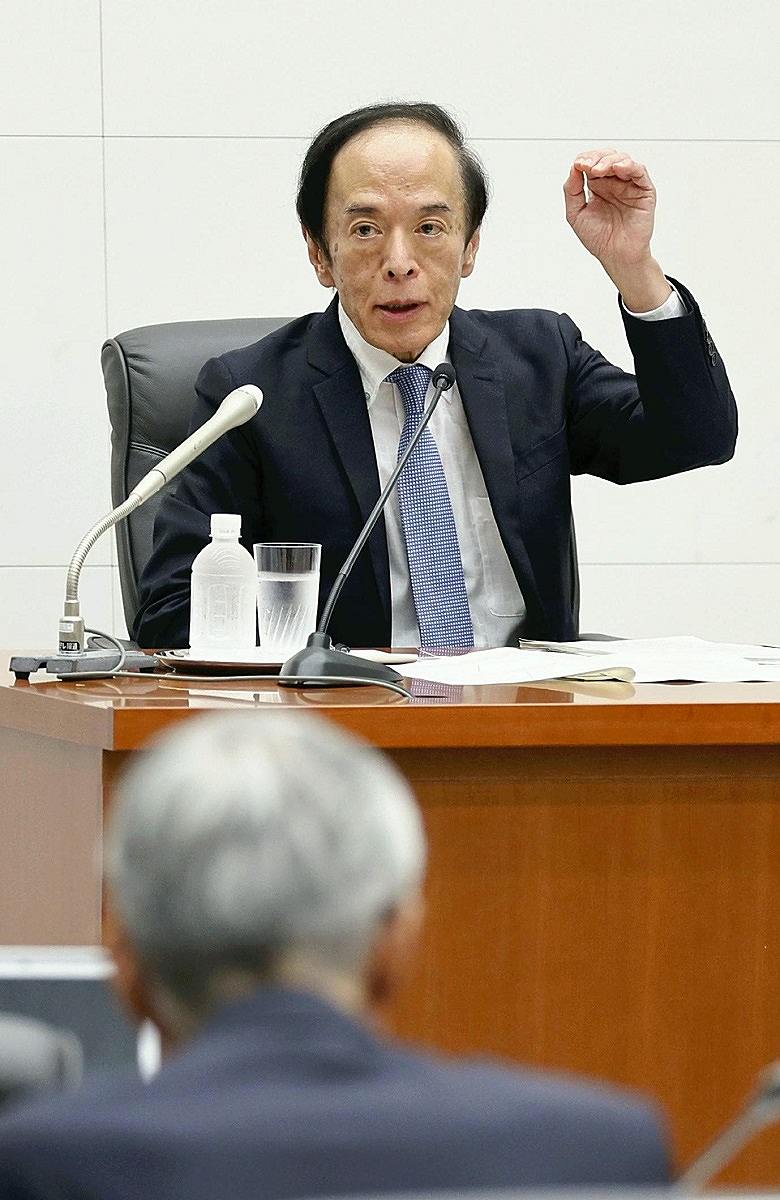
Bank of Japan Gov. Kazuo Ueda speaks at a press conference after a BOJ Policy Board meeting on Friday.
14:29 JST, July 29, 2023
The Bank of Japan’s decision to allow the long-term interest rate to rise to 1% is widely seen within the BOJ as “laying the groundwork” for a de facto scaling back of monetary easing, even while the central bank stresses a continuation of the policy.
The current economic situation in which wage hikes are spreading amid rising prices likely prompted the BOJ’s move.
After the central bank announced that it would make its long-term interest rate operations more flexible, the yield on 10-year Japanese government bonds, Japan’s leading indicator of the long-term interest rate, rose well above 0.5%.
At a press conference following the central bank’s Policy Board meeting on Friday, BOJ Gov. Kazuo Ueda stressed anew his position that monetary easing is essential to underpin consumption and investment amid inflation caused by the high cost of raw materials.
“It’s necessary to persistently continue monetary easing,” he said.
Ueda believes there will be a rise in the expected inflation rate — how firms and individuals see future prices — resulting in a decline in the real interest rate.
The nominal interest rate is determined by market transactions, and the real interest rate is obtained by subtracting the expected inflation rate from the nominal interest rate. So, even when the market interest rate stays at the same level, the higher the expected inflation rate, the lower the real interest rate.
The expected inflation rate in the country has been rising since last year due to price surges. The BOJ believes that even if the market interest rate rises, the real interest rate and the effects of monetary easing will remain the same.
“We do not expect [the long-term interest rate] to exceed the 1% level. It is an upper limit, or a cap, just in case,” Ueda said, regarding the BOJ’s decision to allow the long-term interest rate to rise to 1%.
The market view is that the long-term interest rate will stay at around 0.6% to 0.8% as long as the BOJ keeps the short-term rate at minus 0.1%.
“It’s unlikely that the long-term interest rate will rise above 1% until the BOJ achieves its inflation target and raises interest rates,” said Ayako Fujita of JPMorgan Securities Co. “The BOJ’s latest decision is technically a step toward hollowing out the yield curve control.”
In mid-July, the government told the BOJ that “monetary easing should be continued” amid high prices that are causing households to suffer.
Finance Minister Shunichi Suzuki praised the BOJ’s latest decision. “I see it as a way to enhance the sustainability of monetary easing,” he told reporters on Friday evening.
However, if the BOJ holds down the long-term interest rate at 0.5%, it will be forced to purchase a large amount of JGBs to counter rising interest rates in the market. The BOJ already owns as much as about 50% of outstanding JGBs, and there are concerns that this could have an increasingly negative impact on market transactions.
Top Articles in Business
-

Prudential Life Insurance Plans to Fully Compensate for Damages Caused by Fraudulent Actions Without Waiting for Third-Party Committee Review
-

Narita Airport, Startup in Japan Demonstrate Machine to Compress Clothes for Tourists to Prevent People from Abandoning Suitcases
-

Japan, U.S. Name 3 Inaugural Investment Projects; Reached Agreement After Considerable Difficulty
-

Toyota Motor Group Firm to Sell Clean Energy Greenhouses for Strawberries
-

SoftBank Launches AI Service for Call Centers That Converts Harsh Customer Voices into Softer Voices
JN ACCESS RANKING
-

Japan PM Takaichi’s Cabinet Resigns en Masse
-

Japan Institute to Use Domestic Commercial Optical Lattice Clock to Set Japan Standard Time
-

Israeli Ambassador to Japan Speaks about Japan’s Role in the Reconstruction of Gaza
-

Man Infected with Measles Reportedly Dined at Restaurant in Tokyo Station
-

Videos Plagiarized, Reposted with False Subtitles Claiming ‘Ryukyu Belongs to China’; Anti-China False Information Also Posted in Japan





















